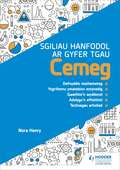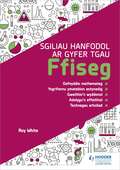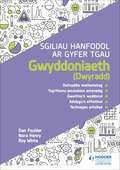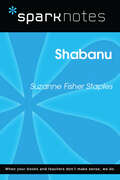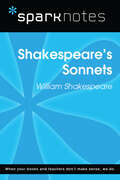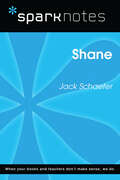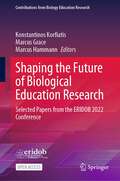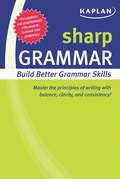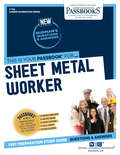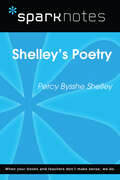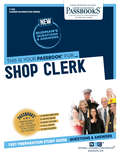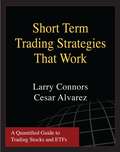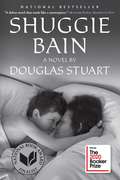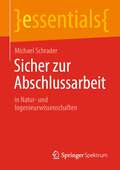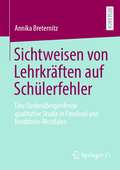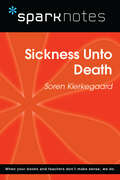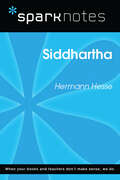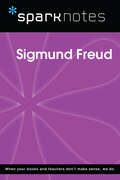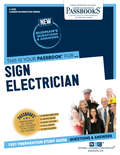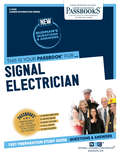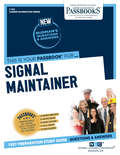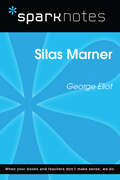- Table View
- List View
Sgiliau Hanfodol ar gyfer TGAU Cemeg (Essential Skills for GCSE Chemistry: Welsh-language edition)
by Nora HenryThis book is the Welsh Language Edition.Build essential maths, literacy and working scientifically skills to boost marks in GCSE Chemistry and ensure that students reach their full potential.Suitable for all specifications, this skills book provides additional support and will help to:- Sharpen mathematical skills with plenty of practice questions and coverage of all the maths techniques needed for the exams.- Improve literacy skills with tips on how to write longer answers, plus peer-assessment marking activities.- Develop the working scientifically skills needed to plan, carry out and evaluate practical experiments, in order to secure the maximum number of marks.- Build confidence by putting skills into practice; using our three-step formula students will progress from worked examples to guided questions and exam-style questions, with fully-worked solutions in the book.- Raise performance in the exams with practical advice on how to revise effectively and tips on understanding the questions, command words and assessment objectives.
Sgiliau Hanfodol ar gyfer TGAU Ffiseg (Essential Skills for GCSE Physics: Welsh-language edition)
by Roy WhiteThis book is the Welsh Language edition.Build essential maths, literacy and working scientifically skills to boost marks in GCSE Physics and ensure that students reach their full potential.Suitable for all specifications, this skills book provides additional support and will help to:- Sharpen mathematical skills with plenty of practice questions and coverage of all the maths techniques needed for the exams.- Improve literacy skills with tips on how to write longer answers, plus peer-assessment marking activities.- Develop the working scientifically skills needed to plan, carry out and evaluate practical experiments, in order to secure the maximum number of marks.- Build confidence by putting skills into practice; using our three-step formula students will progress from worked examples to guided questions and exam-style questions, with fully-worked solutions in the book.- Raise performance in the exams with practical advice on how to revise effectively and tips on understanding the questions, command words and assessment objectives.
Sgiliau Hanfodol ar gyfer TGAU Ffiseg (Essential Skills for GCSE Physics: Welsh-language edition)
by Roy WhiteThis book is the Welsh Language edition.Build essential maths, literacy and working scientifically skills to boost marks in GCSE Physics and ensure that students reach their full potential.Suitable for all specifications, this skills book provides additional support and will help to:- Sharpen mathematical skills with plenty of practice questions and coverage of all the maths techniques needed for the exams.- Improve literacy skills with tips on how to write longer answers, plus peer-assessment marking activities.- Develop the working scientifically skills needed to plan, carry out and evaluate practical experiments, in order to secure the maximum number of marks.- Build confidence by putting skills into practice; using our three-step formula students will progress from worked examples to guided questions and exam-style questions, with fully-worked solutions in the book.- Raise performance in the exams with practical advice on how to revise effectively and tips on understanding the questions, command words and assessment objectives.
Sgiliau Hanfodol ar gyfer TGAU Gwyddoniaeth (Dwyradd)
by Nora Henry Dan Foulder Roy WhiteWELSH EDITIONBuild essential maths, literacy and working scientifically skills to boost marks in GCSE Science and ensure that students reach their full potential with this Welsh edition skills book.Suitable for all specifications, this skills book provides additional support and will help to:- Sharpen mathematical skills with plenty of practice questions and coverage of all the maths techniques needed for the exams.- Improve literacy skills with tips on how to write longer answers, plus peer-assessment marking activities.- Develop the working scientifically skills needed to plan, carry out and evaluate practical experiments, in order to secure the maximum number of marks.- Build confidence by putting skills into practice; using our three-step formula students will progress from worked examples to guided questions and exam-style questions, with fully-worked solutions in the book.- Raise performance in the exams with practical advice on how to revise effectively and tips on understanding the questions, command words and assessment objectives.
Sgiliau Hanfodol ar gyfer TGAU Gwyddoniaeth (Dwyradd)
by Nora Henry Dan Foulder Roy WhiteWELSH EDITIONBuild essential maths, literacy and working scientifically skills to boost marks in GCSE Science and ensure that students reach their full potential with this Welsh edition skills book.Suitable for all specifications, this skills book provides additional support and will help to:- Sharpen mathematical skills with plenty of practice questions and coverage of all the maths techniques needed for the exams.- Improve literacy skills with tips on how to write longer answers, plus peer-assessment marking activities.- Develop the working scientifically skills needed to plan, carry out and evaluate practical experiments, in order to secure the maximum number of marks.- Build confidence by putting skills into practice; using our three-step formula students will progress from worked examples to guided questions and exam-style questions, with fully-worked solutions in the book.- Raise performance in the exams with practical advice on how to revise effectively and tips on understanding the questions, command words and assessment objectives.
Shabanu (SparkNotes Literature Guide Series)
by SparkNotesShabanu (SparkNotes Literature Guide) by Suzanne Fisher Staples Making the reading experience fun! Created by Harvard students for students everywhere, SparkNotes is a new breed of study guide: smarter, better, faster. Geared to what today's students need to know, SparkNotes provides: *Chapter-by-chapter analysis *Explanations of key themes, motifs, and symbols *A review quiz and essay topicsLively and accessible, these guides are perfect for late-night studying and writing papers
Shakespeare's Sonnets (SparkNotes Literature Guide Series)
by SparkNotesShakespeare's Sonnets (SparkNotes Literature Guide) by William Shakespeare Making the reading experience fun! Created by Harvard students for students everywhere, SparkNotes is a new breed of study guide: smarter, better, faster. Geared to what today's students need to know, SparkNotes provides: *Chapter-by-chapter analysis *Explanations of key themes, motifs, and symbols *A review quiz and essay topicsLively and accessible, these guides are perfect for late-night studying and writing papers
Shane (SparkNotes Literature Guide Series)
by SparkNotesShane (SparkNotes Literature Guide) by Jack Schaefer Making the reading experience fun! Created by Harvard students for students everywhere, SparkNotes is a new breed of study guide: smarter, better, faster. Geared to what today's students need to know, SparkNotes provides: *Chapter-by-chapter analysis *Explanations of key themes, motifs, and symbols *A review quiz and essay topicsLively and accessible, these guides are perfect for late-night studying and writing papers
Shaping the Future of Biological Education Research: Selected Papers from the ERIDOB 2022 Conference (Contributions from Biology Education Research)
by Marcus Hammann Marcus Grace Konstantinos KorfiatisThis open access volume is a collection of full papers based on the peer-reviewed presentations accepted for the European Researchers in Didactics of Biology, ERIDOB 2022 conference. ERIDOB aims to bring together researchers in didactics of Biology from Europe and around the world to share and discuss their research work and results. It is the only major international conference whose focus lies exclusively on biology education research, and all the papers are written by international researchers from across Europe (and beyond) which report on a range of contemporary biology education research projects. They are all entirely new papers describing new research in the field. Each paper has been peer-reviewed by experienced biology education researchers and the members of the ERIDOB Academic Committee. The selected papers are collated within the following categories of biology education: · Teaching Strategies and Learning Environments · Students’ Knowledge, Conceptions, Values, Attitudes and Motivation · Outdoor and Environmental Education · Biology Teachers’ Professional Development By providing a collection of new research findings from many countries, this book is a great resource for researchers and practitioners such as school, college and university biology teachers' around the world. It is useful for training biology teachers and therefore valuable to teacher training institutions.
Sharp Grammar
by KaplanFeatures: A 10-question quiz in every chapter to show readers where they need the most help. Information on grammar, sentence structure, style, usage, punctuation, and mechanics. A variety of practice exercises with detailed answer explanations for every topic. A recognition and recall chapter test that includes material from the entire chapter to once again reinforce what the reader has learned on a large scale. Detailed answer explanations follow the chapter test. Chapter summaries for easy review.
Sheet Metal Worker: Passbooks Study Guide (Career Examination Series #C-1711)
by National Learning CorporationThe Sheet Metal Worker Passbook® prepares you for your test by allowing you to take practice exams in the subjects you need to study. It provides hundreds of questions and answers in the areas that will likely be covered on your upcoming exam.
Shelley's Poetry (SparkNotes Literature Guide Series)
by SparkNotesShelley's Poetry (SparkNotes Literature Guide) by Percy Bysshe Shelley Making the reading experience fun! Created by Harvard students for students everywhere, SparkNotes is a new breed of study guide: smarter, better, faster. Geared to what today's students need to know, SparkNotes provides: *Chapter-by-chapter analysis *Explanations of key themes, motifs, and symbols *A review quiz and essay topicsLively and accessible, these guides are perfect for late-night studying and writing papers
Shop Clerk: Passbooks Study Guide (Career Examination Series)
by National Learning CorporationThe Shop Clerk Passbook® prepares you for your test by allowing you to take practice exams in the subjects you need to study. It provides hundreds of questions and answers in the areas that will likely be covered on your upcoming exam.
Short Term Trading Strategy That Works: A Qualified Guide to Trading Stocks and ETFs
by Cesar Alvarez Larry ConnorsThe top-selling trading book from Connors and Alvarez now comes in paperback! Market volatility has been at record levels in recent months, leaving every trader and investor to ask the same question: "Am I prepared to handle the market conditions?" In Larry Connors', CEO and Founder of TradingMarkets, Short Term Trading Strategies That Work, he discusses 16 simple strategies crucial to the success of any trader or investor. These strategies have been both back-tested up to 2008, but also have been traded by Larry and his team under multiple market conditions. This is the must have book for anyone seeking to improve their trading in any market condition. You'll see strategies and methods which you've likely never seen before, all of which are statistically backed by more than a decade's worth of research.
Shuggie Bain: A Novel
by Douglas StuartWinner of the 2020 Booker Prize, this is the unforgettable story of Hugh "Shuggie" Bain, a sweet and lonely boy, the youngest of three children, who spends his 1980s childhood in run-down public housing in Glasgow, Scotland, taking care of his beloved mother Agnes. Agnes is a proud, beautiful woman who turns herself out like her idol Elizabeth Taylor, but she is an alcoholic, and spends most of the family's weekly benefits money on extra-strong lager and bottles of vodka. A heartbreaking story of addiction, sexuality, and love, Shuggie Bain is an epic portrayal of a working-class family and a queer childhood from a masterful novelist, one of the most talented debut writers of recent years. Included is Grove Press's Reading Group Guide with discussion questions for reading groups by Paula Cooper.
Sicher zur Abschlussarbeit: in Natur- und Ingenieurwissenschaften (essentials)
by Michael SchraderDiese Anleitung wird Sie mit vielen Tipps bei der Planung Ihrer Abschlussarbeit unterstützen. Dazu werden Vorgaben zur Strukturierung Ihrer Arbeit sowie die Bausteine naturwissenschaftlicher Publikationen vorgestellt. Mittels umfangreicher tabellarischen Checklisten können Sie dann selbst Ihre Arbeit optimieren. Es folgen Hinweise zur Abgabe und zu Aktivitäten danach. Dabei bleibt dieser Text so kompakt, dass Sie ihn parallel zur Erstellung Ihrer Arbeit erarbeiten können.
Sichtweisen von Lehrkräften auf Schülerfehler: Eine länderübergreifende qualitative Studie in Finnland und Nordrhein-Westfalen
by Annika BreternitzAnnika Breternitz geht in diesem Buch der Frage nach, welche Sichtweisen Lehrkräfte auf Schülerfehler haben und welche Einflussfaktoren diese Sichtweisen prägen. Die Sichtweisen Fehler als Lernchance wie auch als zu sanktionierende Fehlleistung anzusehen, haben ihre Legitimität im Kontext Schule. In der heutigen Professionalitätsdiskussion wird auf die Relevanz des konstruktiven Umgangs der Lehrkräfte mit Schülerfehlern immer wieder hingewiesen. Die Autorin untersucht mit dem Blick auf die (generelle) Ambivalenz der Wertung von Fehlern, welche Sichtweisen der Lehrkräfte erkennbar werden und welche Faktoren (wie z.B. Schulform, Aufgabe der Lehrkräfte, Ausbildung) diese beeinflussen. Hierbei liegt ein Schwerpunkt auf einen länderübergreifenden Ansatz, der die finnischen und deutschen Bildungssysteme in den Blick nimmt.
Sickness Unto Death (SparkNotes Philosophy Guide)
by SparkNotesSickness Unto Death (SparkNotes Philosophy Guide) Making the reading experience fun! SparkNotes Philosophy Guides are one-stop guides to the great works of philosophy–masterpieces that stand at the foundations of Western thought. Inside each Philosophy Guide you&’ll find insightful overviews of great philosophical works of the Western world.
Siddhartha (SparkNotes Literature Guide Series)
by SparkNotesSiddhartha (SparkNotes Literature Guide) by Hermann Hesse Making the reading experience fun! Created by Harvard students for students everywhere, SparkNotes is a new breed of study guide: smarter, better, faster. Geared to what today's students need to know, SparkNotes provides: *Chapter-by-chapter analysis *Explanations of key themes, motifs, and symbols *A review quiz and essay topicsLively and accessible, these guides are perfect for late-night studying and writing papers
Sigmund Freud (SparkNotes Biography Guide)
by SparkNotesSigmund Freud (SparkNotes Biography Guide) Making the reading experience fun! SparkNotes Biography Guides examine the lives of historical luminaries, from Alexander the Great to Virginia Woolf. Each biography guide includes:An examination of the historical context in which the person lived A summary of the person&’s life and achievements A glossary of important terms, people, and events An in-depth look at the key epochs in the person&’s career Study questions and essay topics A review test Suggestions for further reading Whether you&’re a student of history or just a student cramming for a history exam, SparkNotes Biography guides are a reliable, thorough, and readable resource.
Sign Electrician: Passbooks Study Guide (Career Examination Series)
by National Learning CorporationThe Sign Electrician Passbook® prepares you for your test by allowing you to take practice exams in the subjects you need to study. It provides hundreds of questions and answers in the areas that will likely be covered on your upcoming exam.
Signal Electrician: Passbooks Study Guide (Career Examination Series)
by National Learning CorporationThe Signal Electrician Passbook® prepares you for your test by allowing you to take practice exams in the subjects you need to study. It provides hundreds of questions and answers in the areas that will likely be covered on your upcoming exam, including but not limited to: basic principles of electricity; principles, practices, tools and equipment of the electrical trade; operation, maintenance and repair of traffic signals; basic electronics; and more.
Signal Maintainer: Passbooks Study Guide (Career Examination Series #C-742)
by National Learning CorporationThe Signal Maintainer Passbook® prepares you for your test by allowing you to take practice exams in the subjects you need to study. It provides hundreds of questions and answers in the areas that will likely be covered on your upcoming exam, including but not limited to: installation, maintenance and repair of electrical, electronic and electro-mechanical systems; electrical theory and principles; technical drawings; safety and emergency procedures; tools and equipment; shop mathematics; and more.
Silas Marner (SparkNotes Literature Guide Series)
by SparkNotesSilas Marner (SparkNotes Literature Guide) by George Eliot Making the reading experience fun! Created by Harvard students for students everywhere, SparkNotes is a new breed of study guide: smarter, better, faster. Geared to what today's students need to know, SparkNotes provides: *Chapter-by-chapter analysis *Explanations of key themes, motifs, and symbols *A review quiz and essay topicsLively and accessible, these guides are perfect for late-night studying and writing papers
Simple Solutions: Reading Comprehension
by Diane Dillon Nancy Tondy Nancy L. McGraw Lauren DambrogioSimple Solutions Reading Comprehension
